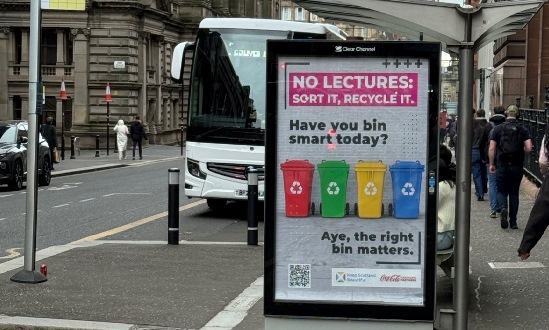
Keep Scotland Beautiful’s research shows consumers often chose to dispose of their waste in the first bin found, rather than recycle it or litter it.
Working with Strathclyde University, the ‘No lectures: sort it and recycle it’ campaign is designed to test different messages (both emotional and educational), as well as incentives, to understand what lever drives the greatest behaviour change among students and, ultimately, the highest increase in recycling rates.
The opinions gathered from students alongside recycling tonnage data collected will help the environmental charity and its partners to understand what levers and messaging tactics were most effective.
Advertising materials will be installed on local bus shelters and digital platforms and two Reverse Vending Machines provided by TOMRA will be installed on campus in early November, testing students’ reactions to rewards for returning bottles and cans.
Not-for-profit organisation Every Can Counts will lead a community-based activity designed to educate students on the lifecycle of aluminum cans, and where students will be invited to create an art installation made from recycled materials.
Barry Fisher, chief executive, Keep Scotland Beautiful, said: “Research with students has identified that for some the first bin passed is the correct bin, so by asking the question ‘Have you bin smart today?’ in the campaign messaging we hope to make the point that the right bin does matter.
“It’s vital that we encourage everyone to consider what they do with their single-use drinks packaging. Only by working in collaboration with national and local government, businesses and communities are we able to test campaign messages and evaluate their success.
“Ultimately, we want to see people recycling more, reducing the potential for waste to be littered and capturing it so that we can live in a more circular economy. But, to do this we recognise that we need to help make it as easy as possible for people – and we hope the findings from this campaign will shape those to come and truly shift our habits to become more sustainable.”
Jo Padwick, Sustainability Manager at CCEP, said: “We’re proud to support Keep Scotland Beautiful and Strathclyde University on this recycling campaign and get a better understanding of what levers have the most direct impact on students’ recycling habits today. CCEP has a goal of collecting and recycling a bottle or can for each one we sell by 2030 so understanding what messaging will cut through or what incentives will help to support us towards this mission is key. And we can’t wait to see the results!”
Scott Bryson, waste & environmental compliance manager, University of Strathclyde, added: “We are delighted to be helping Keep Scotland Beautiful with their focus groups and recycling intervention delivery plan. We already have a very high recycling rates but this campaign will raise further awareness of the importance of recycling properly among young people on campus.”





